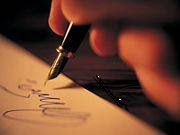LIBERAL: implies tolerance of others' values as well as open-mindedness to ideas that challenge tradition, established institutions, etc.(Webster's New World Dictionary) ------------------------------
Liberals tend to argue among themselves, often to the curiosity and ridicule of persons of a different stripe. It makes sense, however, when one follows the definition stated above. The embrace of dialogue with opponents, often to the point of passionate conflict, is seen as a positive...a way of working out the matter before them. When the late Senator Ted Kennedy died recently, it was amazing to many to hear of his affection for, and friendship with, members of the more conservative ranks of Congress. Sometimes those persons were within his own party. However, it was an icon moment. Senator Kennedy knew that the process of arguing out an issue with someone who differed in perspective was the best way to refine the issue and allow a healthy decision to emerge. It was a good lesson for those of us watching.
Being open to the needs of the powerless in society grows from the respect liberals have for challenging the traditions and institutions within it. Fighting racism, poverty, sexism, ageism, and all the other "isms" is natural to the bent of liberals. When those ills are exposed and seen as detrimental to a portion of society, the passion of liberals has been known to trump the need to respect "the way we've always done it." Moving ahead with speed to correct the ill flies in the face of those who require more time, a slower pace, and a more moderated method in dealing with problems. To a liberal, passion may over-ride caution.
Many times that leads to criticism that liberals are weak in their defense of the U.S. Constitution. Liberals respond that the intent of the framers of the Constitution is more important than haggling over the specific words. That affection for interpretation of intent is not popular among more conservative types.
The liberal embrace of programs to lift the poor from their poverty, and similar issues, is costly, so liberals are accused of being quick to spend money, often by taxing the populace. More government may be required to oversee such programs, so liberals are accused of being too willing to build a large government. It is important to see that these issues grow from a basic, inherent passion among liberals for the nation to be a place where each person, regardless of race, creed, gender, orientation or other characteristics is allowed a chance to flourish.
As with conservatism there is an extreme to being liberal, often referred to as being radical. Most liberals are uncomfortable with this position, as it tends to remove the possibility for dialogue with opponents.
NEXT POST: MODERATE
Tuesday, October 20, 2009
Subscribe to:
Post Comments (Atom)

Jedword, would you comment on the differences or similarities between the theories discussed in "Liberal Post 2" and the definition of Libertarian? http://www.theihs.org/ContentDetails.aspx?id=626
ReplyDeleteKeep em coming, Ed. You've got much to say and offer. So glad you're doing this.
ReplyDeleteZenDogSam asked about the difference between Liberal and Libertarian. As I understand it, a Libertarian is one who seeks freedom from restrictions imposed by government. Libertarians traditionally oppose taxation, government oversight, licensing, etc. The dictionary uses the term that libertarians seek "full civil liberties." This is a dramatic difference from my understanding of a "liberal."
ReplyDelete